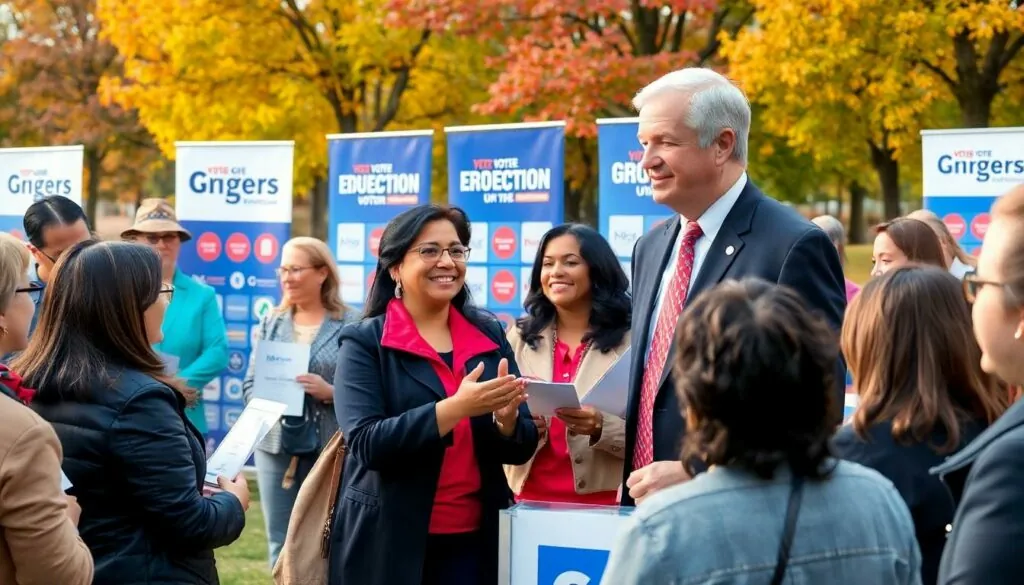As the leaves turn and the air gets a little crisper, Macomb County prepares for another thrilling election season. It’s that time when residents trade their pumpkin spice lattes for ballots and debates. Whether you’re a seasoned voter or just curious about the local candidates, this election cycle promises to be anything but boring.
Table of Contents
ToggleOverview of Macomb County Elections
Macomb County elections feature local, state, and federal races that engage voters across the region. Each election cycle includes positions such as county executive, county commission, and various district judges. Voter participation consistently impacts the outcomes, influencing policies and community initiatives.
Election dates occur on a set schedule, often on the first Tuesday after the first Monday in November for general elections. This timing maximizes attendance as it coincides with established voting traditions. Absentee voting options provide accessibility, ensuring that all residents can cast their ballots, even if unable to appear in person.
Candidates in Macomb County often focus on key issues, including public safety, education, and infrastructure. Understanding these priorities helps residents make informed decisions. Campaign strategies vary, with many candidates utilizing social media platforms to reach voters more effectively.
Local organizations play a significant role in educating the public about upcoming elections. These efforts include hosting candidate forums and distributing nonpartisan voter guides. Engaging with these resources enhances voter awareness and participation.
Election results are typically available on the Macomb County Clerk’s Office website, providing transparency to residents. The process of tallying votes employs strict security measures to ensure fairness and accuracy. Post-election, officials often analyze data to assess voter turnout and engagement trends for future elections, aiming to foster even higher participation in subsequent cycles.
Historical Context

Macomb County’s electoral history showcases significant developments over the years. Residents have seen the evolution of voting practices and the impact of key milestones on local governance.
Key Milestones
Important events have shaped the political landscape of Macomb County. The establishment of the county in 1818 marked the beginning of organized governance. In 1964, the introduction of the Voting Rights Act profoundly affected voter participation by prohibiting racial discrimination. The shift to electronic voting systems in 2004 streamlined the voting process, improving access and efficiency. More recently, the implementation of no-reason absentee voting in 2018 has made it easier for residents to cast their ballots. Each milestone reflects a commitment to enhancing democracy and encouraging voter engagement across the county.
Changes in Voting Laws
Voting laws in Macomb County have undergone significant changes. The expansion of early voting options in 2020 allowed residents to participate in elections before Election Day, increasing accessibility. Changes in voter ID requirements in 2018 aimed to balance security and ease of access for voters. The introduction of automatic voter registration in 2021 streamlined the registration process for eligible residents. Local election officials continually adapt to new regulations and technologies, ensuring that voting remains accessible and secure for all constituents.
Current Election Landscape
The upcoming election season in Macomb County presents an engaging environment for voters. Key parties and candidates are shaping the political discourse.
Major Parties and Candidates
Democrats and Republicans dominate the political landscape. Prominent candidates for county executive include the Democratic incumbent and a Republican challenger. Local commission races feature candidates focused on community issues such as public safety and infrastructure. Candidates often utilize social media to enhance voter engagement. Voter outreach occurs through community events, allowing residents to interact with candidates directly.
Election Procedures
Voting in Macomb County includes various methods to accommodate residents. Absentee voting promotes accessibility by allowing voters to cast ballots without attending polling places. Early voting options are available, enhancing participation rates. Polling locations are strategically placed throughout the county to ensure convenience. Election materials, including sample ballots, are accessible online for voter review. Transparency in election procedures is essential, with results published on the county clerk’s website.
Voter Engagement
Voter engagement plays a crucial role in shaping the outcomes of Macomb County elections. Active participation ensures that diverse voices contribute to local governance.
Turnout Trends
Turnout trends have shown significant fluctuations in recent elections. The historical average voter turnout in Macomb County hovers around 60 percent, but spikes occur during major elections. For instance, the 2020 election saw approximately 75 percent turnout, reflecting heightened civic interest. Factors influencing these trends include the competitiveness of races and heightened focus on key issues like public safety or education. Understanding these dynamics helps local organizations tailor their outreach strategies effectively.
Community Involvement Initiatives
Community involvement initiatives are essential for fostering a democratic environment. Organizations across Macomb County host candidate forums, which allow residents to engage directly with candidates. Educational workshops provide resources for first-time voters, increasing comfort and knowledge about the election process. Local nonprofits often create nonpartisan voter guides, making candidate stances clear and accessible. Volunteer groups also mobilize efforts to assist voters with absentee ballots, ensuring that everyone can participate, regardless of their circumstances. Such initiatives enhance civic engagement and strengthen the democratic process in Macomb County.
Challenges Facing Macomb County Elections
Macomb County elections face significant challenges that impact voter participation and the integrity of the electoral process.
Voter Suppression Concerns
Voter suppression stands as a pressing issue in Macomb County. Reports indicate that certain demographics experience obstacles when accessing ballots and polling places. Minority groups often encounter challenges, such as misinformation regarding voting requirements. Strict ID laws may disproportionately affect low-income voters. Local organizations actively work to combat these challenges through education and advocacy. Awareness campaigns seek to inform residents about their voting rights, ensuring all voices are heard. Moreover, outreach programs aim to provide resources and assistance for those facing hurdles in the voting process.
Misinformation and Its Impact
Misinformation poses a substantial threat to the upcoming elections in Macomb County. False claims about voting procedures circulate rapidly on social media platforms. Many residents struggle to discern fact from fiction, which can lead to confusion regarding essential elements of the electoral process. Misinformation not only discourages voter turnout but also undermines public trust in election outcomes. To counter this problem, local officials prioritize transparent communication. Educational initiatives strive to clarify voting processes while providing accurate information about candidates and issues. Collaborations between civic groups and local media aim to promote fact-checking efforts and address misinformation effectively.
The upcoming elections in Macomb County present a vital opportunity for residents to engage in shaping their community’s future. With a diverse range of candidates and key issues at stake voter participation will be crucial in influencing local governance. The commitment to transparency and accessibility through various voting methods ensures that every voice can be heard. As the election season unfolds it’s essential for residents to stay informed and actively participate in this democratic process. By doing so they can help create a more inclusive and representative political landscape in Macomb County.





